新概念第一册第71、72课
新概念英语第一册lesson71-72教材
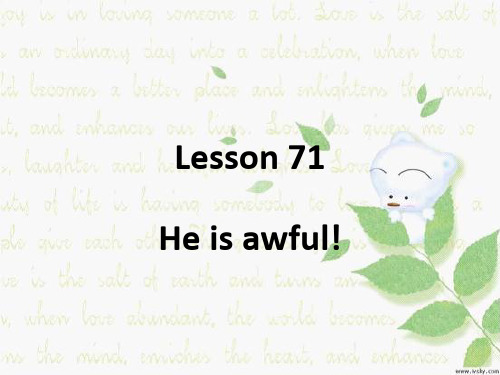
I made a big mistake.
5. I’m sorry I’m late.
I’m sorry for being late.
* be sorry for sth/doing sth 对某事感觉很抱歉
我对我犯的错误感觉很抱歉。
日常用语——受到批评
(一)常用句型——表示批评 1. You have gone too far.
你太过分了。 It’s going a bit too far. It’s really annoying. * annoying 令人烦恼的,令人恼火的
2. I keep telling her not to do it, but it just goes in through one ear and out the other.
③ n. 答案;解决办法;答复 • 我给他写了好几封信,可都没有回音。
I wrote him several letters but couldn't get an answer. • 你知道第十题的答案吗?
Do you know the answer to Question 10?
• This is one of the possible answers to today's environmental problems. 这是有可能解决当今环境问题的办法之 一。
She pretended herself as her mother.
ቤተ መጻሕፍቲ ባይዱ习
• Why Pauline thinks that Ron is awlful? • How many times did Ron telephone
新概念英语第一册:71-72课语法及单词解析
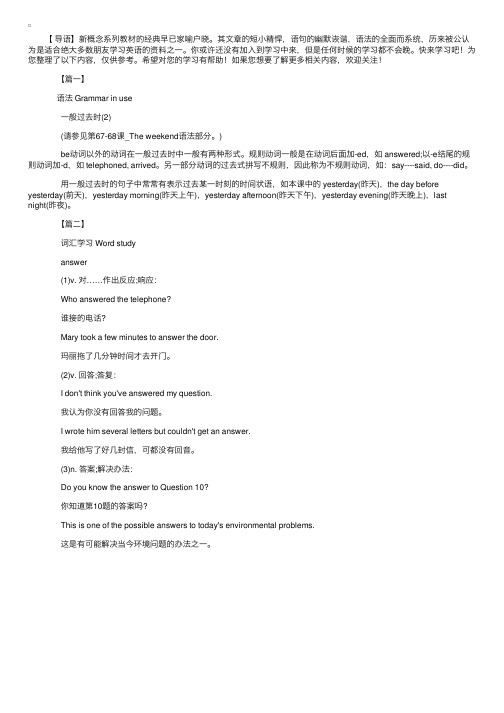
【导语】新概念系列教材的经典早已家喻户晓。
其⽂章的短⼩精悍,语句的幽默诙谐,语法的全⾯⽽系统,历来被公认为是适合绝⼤多数朋友学习英语的资料之⼀。
你或许还没有加⼊到学习中来,但是任何时候的学习都不会晚。
快来学习吧!为您整理了以下内容,仅供参考。
希望对您的学习有帮助!如果您想要了解更多相关内容,欢迎关注!【篇⼀】语法 Grammar in use ⼀般过去时(2) (请参见第67-68课_The weekend语法部分。
) be动词以外的动词在⼀般过去时中⼀般有两种形式。
规则动词⼀般是在动词后⾯加-ed,如 answered;以-e结尾的规则动词加-d,如 telephoned, arrived。
另⼀部分动词的过去式拼写不规则,因此称为不规则动词,如:say----said, do----did。
⽤⼀般过去时的句⼦中常常有表⽰过去某⼀时刻的时间状语,如本课中的 yesterday(昨天),the day before yesterday(前天),yesterday morning(昨天上午),yesterday afternoon(昨天下午),yesterday evening(昨天晚上),lastnight(昨夜)。
【篇⼆】 词汇学习 Word study answer (1)v. 对……作出反应;响应: Who answered the telephone? 谁接的电话? Mary took a few minutes to answer the door. 玛丽拖了⼏分钟时间才去开门。
(2)v. 回答;答复: I don't think you've answered my question. 我认为你没有回答我的问题。
I wrote him several letters but couldn't get an answer. 我给他写了好⼏封信,可都没有回⾳。
新概念英语第一册Lesson71-72(课堂PPT)
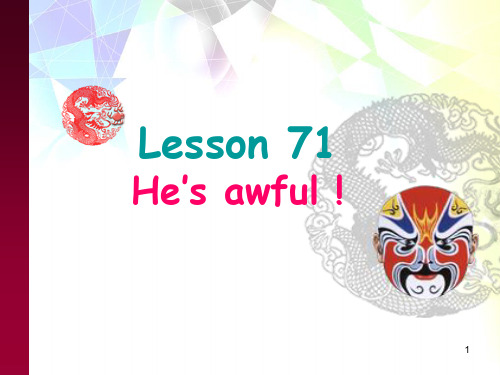
Italy
America
Japan 22
Austria
Australia
Canada
• There were twenty cars in the race. There were Austrian cars, Australian cares, Canadiancars. Dane cars. Finlish cars and Polish cars.
If the train should be on time, I should reach home before dark.
18
★ 介词 in:
一天中的某段时间(in the evening)
月份(in March) 年份(in 1997) 季节(in spring)
世纪(in the 20th century) 节日(in Easter week【时间长的】 ) 时期(in the holidays)
• India • Turkey • Korea • Nigeria [naiˈdʒiəriə]
• Japan
• Russia
• Australia
• Brazil [brəˈzil]
• • • • • •
ACDFPToiaheunlnsanalaatminlrndadaidanardk[ˈdenmɑ:k•••••]
17
★ 介词 on:
(1)具体的时日和一个特定的时间, 如某日、某节日、星期几等。 on Christmas Day ;
on Monday ; on May 4th ; on April ; (2)在某个特定的早晨、下午或晚上。
He arrivs at 10 o’clock on the night of the 5th. (3)准时,按时。
新概念英语第一册课件 NCE1 Lesson 71-72
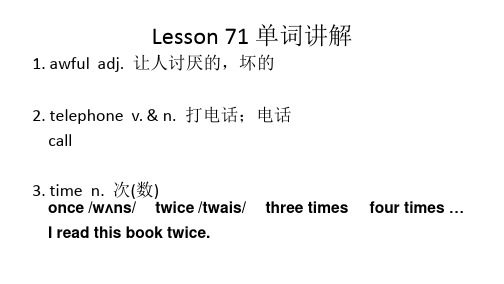
Lesson 71 单词讲解1.awful adj. 让人讨厌的,坏的2.telephone v. & n. 打电话;电话call3.time n. 次(数)once /wʌns/ twice /twais/ three times four times …I read this book twice.4.a nswer v. 接(电话)answer the phonest adj. 最后的,前一次的last night / last week / last month / last year6.phone n. 电话7.again adv. 又一次地Very nice to see you again.8.say (said) v. 说say /sei/ said /sed/ says /sez/say VS speaksay 强调说话的内容She said hello to me.He said sorry to me.My mom always says “Life was like a box of chocolate…”speak 突出说话的方式或动作本身speak loudly speak slowly speak EnglishLesson 71 课文讲解What is the climate like?What is the weather like?He telephoned me again.yesterday evening last nightLesson 71 语法讲解He was in the office.Was he in the office?Yes, he was. No, he wasn’t.He wasn’t in the office.Where was he?Who was in the office?There was a car race in our town in 1998. Was there a car race in our town in 1998? There wasn’t a car race in our town in 1998. What was there in our town in 1998?He went to school yesterday. do did /did/ Did wentDo he go he Do to school yesterday? ? e He like s coffee .He went to school yesterday. do notdid He donotgowent to school yesterday.He didn’t go to school yesterday.He went to school y e s t e r d a y. 他什么时候去上学了?did When do hegowent to school?He went to s c h o o l yesterday. 他昨天去哪了?did goWhere do he went yesterday?He w e n t to school yesterday. 他昨天干什么了?did doWhat do he did yesterday?He went to school yesterday. 昨天谁去上学了?Who went to school y esterday?She lived in New York.Did she live in New York? Yes, she did. No, she didn’t. She didn’t live in New York. Where did she live?Who lived in New York?I bought a book in that bookstore last week. bought /b ɔ : t/ buy 的过去式Did you buy a book in that bookstore last week? Yes, I did. No, I didn’t.I didn’t buy a book in that bookstore last week.When did you buy a book in that bookstore?Where did you buy a book last week?Lesson 72 单词句型讲解Today:this morningthis afternoonthis eveningLesson 72 单词句型讲解t onightLesson 72 单词句型讲解Yesterday:yesterday morningyesterday afternoonyesterday eveningLesson 72 单词句型讲解l ast nightThe day before yesterday:the day before yesterday in the morningthe day before yesterday in the afternoonthe day before yesterday in the evening如遇到视频无法正常播放,课件错误,知识点错t 误h 等e 课n 程问ig 题h ,t 可b 以e 添f 加o 服r 务e Ql Qa 3s 17t 0322794进行解决,学习问题请到知识堂: http:/Tomorrow:tomorrow morningtomorrow afternoontomorrow eveningtomorrow nightThe day after tomorrow:the day after tomorrow in the morningthe day after tomorrow in the afternoonthe day after tomorrow in the eveningthe night after next1.She is going to come now. (when)2.She can come now. (when)3.She wants a new bike. (what)4.There is a book on the table. (what)5.They like black coffee. (what)6.Mary comes from Germany. (where)7.He must go home now. (when)8.She feels ill. (how)9.He has a cold. (what)10.She cleaned her shoes. (when) A 一般疑问句B 特殊疑问句C 否定句1.She is going to come now. (when)Is she going to come now?When is she going to come?She isn’t going to come now.2.She can come now. (when)Can she come now?When can she come?She can’t come now.3.She wants a new bike. (what)Does she want a new bike?What does she want?She doesn’t want a new bike.• 4. There is a book on the table. (what)•Is there a book on the table?•What is there on the table?•There isn’t a book on the table.5.They like black coffee. (what) •Do they like black coffee?•What do they like?•They don’t like black coffee.6.Mary comes from Germany. (where) •Does Mary come from Germany?•Where does Mary come from?•Mary doesn’t come from Germany.7.He must go home now. (when) •Must he go home now?•When must he go home?•He needn’t / mustn’t go home now.8.She feels ill. (how) •Does she feel ill?•How does she feel?•She doesn’t feel ill.9.He has a cold. (what)•Does he have a cold?•What does he have?•What is the matter with him?•He doesn’t have a cold.10.She cleaned her shoes. (when) •Did she clean her shoes?•When did she clean her shoes?•She didn’t clean her shoes.。
新概念第一册Lesson71-72

Answer the telephone ,接电话 Answer the door 应门
speak to sb. 与某人说话=talk to sb. May I speak to Pauline, please? =I’d like to speak to Pauline, please.
once upon a time 很久很久以前
cheat the time 打发时间
We are cheating the time cards. 我们通过打牌打发时间。
watch one’s time 等待时机
I’m watching my time.
by playing
★ answer [ˈɑ:nsə] v. 接(电话)
★ phone= telephone n.电话 [fəun]
phone是希腊语,声音,嗓音,后来有喇叭 的意思,是指用电话听筒代表电话。
telephone有希腊语词头tele,远程的意思。 可以远程传话的话筒就是电话。
由于在所有话筒中电话使用率远远高于 其他话筒,所以在没有歧义的情况下可以用 phone代指telephone,当然phone 还可以代指mobilephone(手机)。
• (3)注意:如果“be”后的主语是由and连接的两 个或两个以上的名词,那么be的形式要遵循 “远亲不如近邻”的原则。也就是说,“be”的 形式是由与它最近的那个名次来决定的。若那个 名词是单数或不可数名词要用is,是复数就用 are。
1,There is a teacher and forty students in the classroom.
are—were
助动词 do---did
实义动词 eat-ate go-went have-had
新概念一册71-72课练习

新概念一册71-72课练习一句型转换1. Ron Marston is awful. (就划线部分提问)is Ron Marston ?2. He telephoned the office yesterday morning. (就划线部分提问)he the office?3. My boss answered the telephone? (变为一般疑问句)your boss the telephone.4. I arrived home at six o’clock yesterday evening. (变为否定句)I home at six o’clock yesterday evening.5. They sharpened their pencils yesterday evening. (就划线部分提问)they yesterday evening?6. There was a car race near our town last year. (就划线部分提问)near your town last year?7. Ron Marston telephoned Pauline four times yesterday. (变为同义句) Ron Marston Pauline four times yesterday.8. She emptied the basket the day before yesterday. (就划线部分提问) What she the day before yesterday?9. He stayed in bed for a week last month. (就划线部分提问)he stay in bed last month? 10. Mother aired the room last night. (变一般疑问句)mother the room last night?。
新概念英语第一册第71-72课-He’s awful

新概念英语第一册第71-72课:He’s awfulLesson 71 He's awful!他讨厌透了! Listen to the tape then answer this question.How did Pauline answer the telephone at nine o'clock?听录音,然后回答问题。
波淋在9点接电话时是如何说的?Jane : What’s Ron Marston like , Pauline ?简:罗恩.马斯顿是怎样一个人?Pauline : He’s awful ! He telephoned me four times yesterday , and three times the day before yesterday.波淋:他讨厌透了!他昨天给我打了4次电话前天打了3次。
Pauline: He telephoned the office yesterday morning and yesterday afternoon. My boss answered the telephone .波淋:他昨天上午和下午把电话打到了我的办公室,是我的老板接的。
Jane : What did your boss say to him ?简:你老板是怎么对他说的?Pauline: He said ,”Pauline is typing letters .She can’t speak to you now !”波淋:他说:“波淋正在打信,她现在不能同你讲话!”Pauline : Then I arrived home at six o’clock yesterday evening .He telephoned again .But I didn’t answer the phone !波淋:后来,我昨晚6点钟回到家里。
他又打来电话,但我没接。
Jane : Did he telephone again last night ?简:他昨夜里又打电话了吗?Pauline : Yes , he did . He telephoned at nine o’clock .波淋:是的,打了。
新概念英语一册71-72课习题
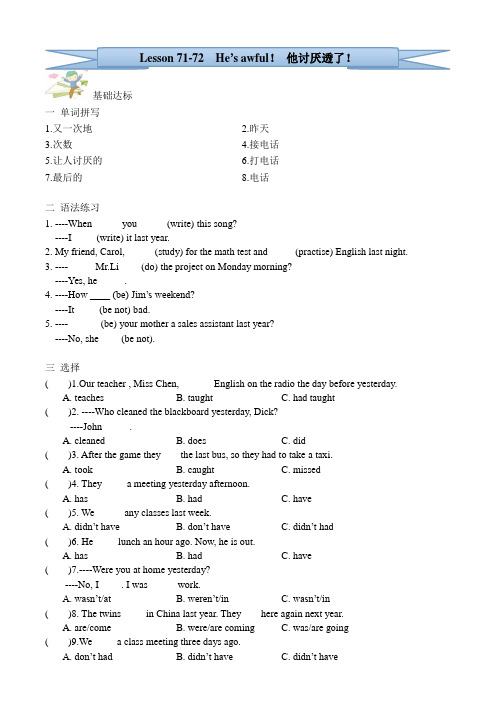
Lesson 71-72 He’s awful!他讨厌透了!基础达标一单词拼写1.又一次地 ____________________2.昨天_________________________3.次数 ________________________4.接电话_______________________5.让人讨厌的 __________________6.打电话_______________________7.最后的 ______________________8.电话_________________________二语法练习1. ----When _____ you _____ (write) this song?----I ____ (write) it last year.2. My friend, Carol, _____ (study) for the math test and _____(practise) English last night.3. ----_____ Mr.Li ____(do) the project on Monday morning?----Yes, he _____.4. ----How ____ (be) Jim’s weekend?----It ____ (be not) bad.5. ----______ (be) your mother a sales assistant last year?----No, she ____(be not).三选择( )1.Our teacher , Miss Chen, ______ English on the radio the day before yesterday.A. teachesB. taughtC. had taught( )2. ----Who cleaned the blackboard yesterday, Dick?----John _____.A. cleanedB. doesC. did( )3. After the game they ___ the last bus, so they had to take a taxi.A. tookB. caughtC. missed( )4. They ____ a meeting yesterday afternoon.A. hasB. hadC. have( )5. We _____ any classes last week.A. didn’t haveB. don’t haveC. didn’t had( )6. He ____ lunch an hour ago. Now, he is out.A. hasB. hadC. have( )7.----Were you at home yesterday?----No, I ____. I was _____ work.A. wasn’t/atB. weren’t/inC. wasn’t/in( )8. The twins ____ in China last year. They ___ here again next year.A. are/comeB. were/are comingC. was/are going( )9.We ____ a class meeting three days ago.A. don’t hadB. didn’t haveC. didn’t have( )10. ----Hello, is that Frank?----No, It’s ____, Mary.A. IB. meC. mine能力提升四阅读Once there was an old man in a town. He always forgot a lot of things. So his wife always had to say to him, “Don’t forget this!”One day he went on a long trip alone. Before he left home, his wife said ,“Now you have all these things. They are what you need for your trip. Take care of your things during the trip.” He went to a station, bought a ticket and got on the train with it.About half an hour later, the conductor began to see the tickets. He came to the old man and said, “Will you please show me your ticket?”The old man looked for his ticket in all his pockets, but he could not find it. He was very worried,“I can’t find my ticket. I really bought a ticket before I got on the train.” said the old man.“I believe you bought a ticket All right, you don’t have to buy another one.” said the conductor kindly. “But how can I know where I’m going ? I can’t remember my station!” the old man said sadly.( )1.The old in the story was very _____.A. kindB. poorC. forgetful( )2. Where is the ticket?A. The old man forgot to buy it.B. The old man couldn’t remember where it is.C. The old man showed it to the conductor.( )3. The old man bought the ticket ____ he got on the train.A. afterB. beforeC. when( )4. The conductor ____ the old man.A. didn’t believeB. laughed atC. believed( )5. The old man was sad because _____.A. he had to buy another ticketB. he lost all the things his wife gave himC. he did not know where he should get off五连词成句1. when ,your ,lost, find, and, did, where, you, car_________________________________________________1.was, born, in, 1988, September, I_________________________________________________2.they, a , that, said, built, year, hospital, before, they, the, last_________________________________________________3.the, didn’t, to, came, her, baby, go, until, mother, bed, back_________________________________________________4.Fiona, go, with, was, because, hiking, didn’t, friends, she, her, ill_________________________________________________。
新概念第一册第71-72课
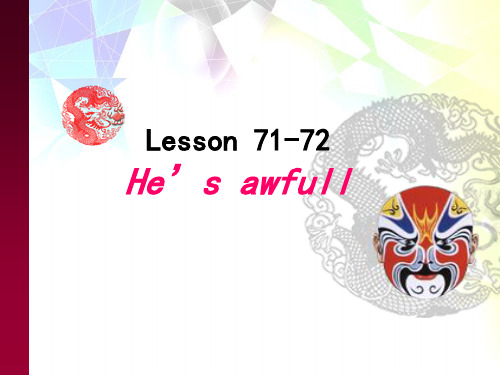
肯定回答:
否定回答:
Yes, he did
No,he didn’t=No, he did not.
特殊疑问句:特殊疑问词+一般疑问句 What did he do yesterday morning?
【过去式的变化规则】
• ① 一般情况下,在动词原形后直接加ed。 如: wanted,played。 • ② 以不发音的字母e结尾的动词,直接加d。 如: hoped,lived。 • ③ 重读闭音节单词需双写最后一个辅音字母,再 加ed。如:stopped, shipped。 • ④ 以辅音字母+y结尾的动词变y为i,再加ed。 如:studied,worried。 • ⑤ 有些动词不符合上面的规则,需要特殊记忆。 如:am(is)-was, are-were, go-went, do-did eat-ate, swim-swam, buy-bought, see-saw, teach-taught, bring-brought, think-thought, fallfell, hurt-hurt, break-broke, win-won, lose-lostLesson 71-72He’s awfull
新概念英语第一册Lesson 71-72
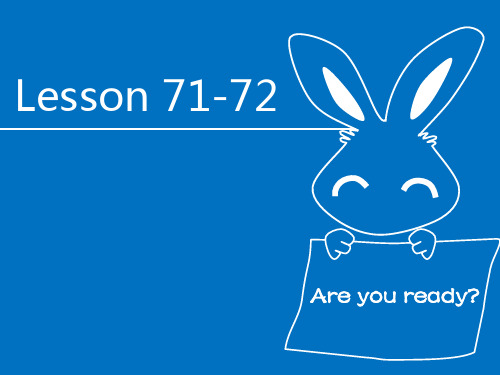
Grammar
一般过去时 要跟表示过去的时间状语连用
今天 today 昨天 yesterday 前天 the day before yesterday
When did you do…?
小试牛刀
What did she/he/they do? they/ clean their shoes/ yesterday he/ open the box/ last night they/ sharpen their pencils/ this evening she/ listen to the radio/ last night they/ play a game/ yesterday afternoon
总结
一般过去式 以实义动词引导的一般过去时 动词的过去式变化规则 表示过去时间的时间状语 句型变化 变否定句 变一般疑问句
See you!
判断下列句子是否正确,正确的写“T”,错误的写“F”, 并改正 01.His mother clean the room every morning. 02.They go to the school on foot every day. 03.He usually reads newspaper after lunch. 04.They don’t doing their homework now. 05.Mr.Black goes to work by a car every day. 06.She and her friend often drinks tea together. 07.I want a envelope,please. 08.I not have any writing papers. 09.What else do you want? 10.The boy playing in the garden.
新概念英语第一册71-72课

May I speak to Pauline, please? I’d like to speak to Pauline, please. 在电话中回答:This is….
课堂小练习:
1、Anna, dinner is ready. Where's Peter? He ( )his homework in his room. A does B did C is doing D will do 2、( ) are the two girls doing in the calssroom. A Who B What C Where D When 3、Lucy is talking( )Tom ( )the sports meeting. A to; about B about; to C with; to D to; with 4、Who is Nancy( )?
改为选择疑问句) 1. What is the man doing in the factory? 2. Here are photos of my family.
3. She likes buying something on Sundays. 4. Are the boys playing volleyball or(playing)basketball?
yesterday evening. He telephoned again. But I didn't answer the phone!
JANE:
Did he telephone again last night?
PAULINE: Yes, he did.
He telephoned at nine o'clock.
新概念英语NCE1_lesson71-72(共13页)课件

• Yes, he did.
• He telephoned (telephone的适当形式) at nine o'clock.
• What did (do的适当形式) you say to him?
您身边的小升初英语专家----鑫鹏学校新概念部
课文再现-英汉互译
• He‘s awful!
• Then I arrived home at six o'clock
• 他讨厌透了!
• What's Ron Marston like, Pauline? • 朗·马斯顿是怎样一个人?
• He telephoned me four times yesterday,
• 前天打了3次。
• He telephoned the office yesterday morning and yesterday afternoon.
• 他昨天上午和下午把电话打到了我的办 公室,
• My boss answered the telephone • 是我的老板接的。
• He said,‘Pauline is typing letters. • 他说:“波琳正在打信,
• What did she do yesterday? • She aired the room yesterday.
• 1 they/ clean their shoes/ yesterday • 2 he/ open the box/ last night • 3 they/ sharpen their pencils/ this morning • 4 she /turn on the television/this evening
新概念一第71-72课课件(完整版)
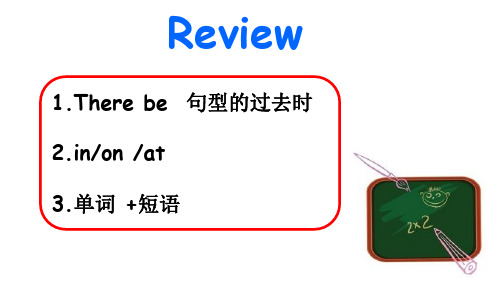
对以下句子的地点进行提问: • I am going to type the letter at home
tomorrow .
• I was at Lily's house last night .
小结:
1:划出句子中所要提问的部分。 2.when /where +然后把剩下的部分改成 一般疑问句
对以下句子的时间进行提问: • I am going to type the letter tomorrow .
• The teacher is busy(忙的) now .
• I was at Lily's house last night .
对“地点”的提问?
• in the classroom
PAULINE: He said, "Pauline is typing letters. She can't speak to you now!"
PAULINE: Then I arrived home at six o'clock yesterday evening.
He telephoned again. But I didn't answer the phone!
last [lɑ:st]
1) I was last in the car race . 2) I was at home last night .
time [taim]
1) What's the time ?
2)He telephoned me 4 times last night .
again [ə'ɡen]
e.g.I'm at home on weekends. When are you at home ?
新概念英语第一册Lesson71-72笔记(语法点+配套练习+答案)
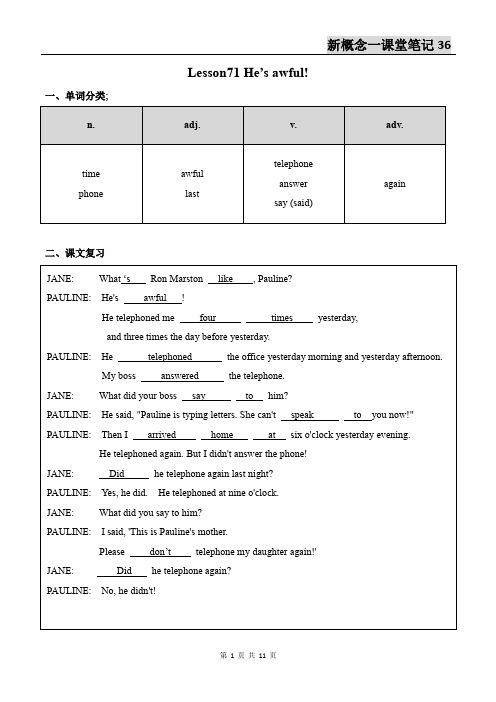
9.Where did you go yesterday?
10.Helen arrived home late last night.
3.动词过去式的变化规则
1直接加ed
2哑音e结尾,加d
3辅元辅,闭音节,双写词尾辅音加ed
4辅音+y结尾,变y为i加ed
练习一:变过去式
again adv.再,又
Please say it again.请再说一遍。
See you again.下次再见。
What's ... like ?...怎么样?
=How is ... ?
What’s your new teacher like? ( B )
A.He is happy.
B.He is tall and kind.
4.Our teacher went to the hospital yesterday.
5.They are going to the restaurant together.
6.Mr.Black often ran around the park last year.
7.There was a book on the floor just now.
Rememberto telephonethe doctor when you fee ill.
生病的时候记得给医生打电话。
Can I use your mobile phone please?
I wantto make a telephone call.
我可以用你的手机吗?我想打一个电话。
time n.
今夜
tonight
新概念英语第一册71-85课后练习答案

新概念英语第一册71-85课后练习答案新概念英语第一册71-85课后练习答案Lesson71-72一.课文详注1.What's Ron Marston like, Pauline? 波琳,朗·马斯顿是怎样一个人?What is sb. like? 这一句式可用来询问某人的外貌或品行。
就本课的具体情况而言,波琳的回答更多地是指马斯顿的品行如何。
2.He telephoned me four times yesterday…他昨天给我打了4次电话……four times, 4次。
time在英语中作不可数名词时表示“时间”;作可数名词时表示“次数”。
请注意英语中次数的表示法:once 1次twice 两次three times 3次3次或3次以上通常都用基数词times表示:five times 5次thirty times 30次3.the day before yesterday, 前天。
4.answer the telephone, 接电话。
口语中也常用answer the phone。
类似的短语如:answer the door/doorbell 应声开门answer a letter回信5.She can't speak to you now! 她现在不能同你讲话!speak to sb. 意为“与某人说话”。
例如打电话时可以说:May I speak to Pauline, please?请让波琳接电话好吗?I' d like to speak to Pauline, please. 我想请波琳听电话。
6.This is Pauline's mother. 我是波琳的母亲。
This is…是英美人打电话时表示“我是……”的句式,而不说I'm…。
相关的电话用语如:This is Mary speaking.我是玛丽。
This is Edward calling from London.我是爱德华,现正在伦敦给你打电话。
新概念英语第一册 71-72课 47张PPT
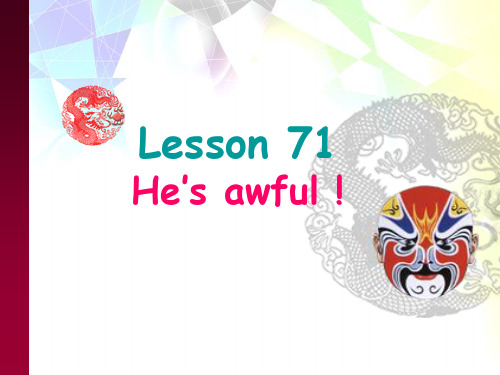
拓展:
once upon a time 很久很久以前
cheat the time 打发时间
We are cheating the time cards. 我们通过打牌打发时间。
watch one’s time 等待时机
I’m watching my time.
by playing
Words:
★ answer [ˈɑ:nsə] v. 接(电话)
① v. 对……作出反应;响应 answer the phone/telephone 接电话 answer the door/doorbell 应声开门 Mary take a few minutes to answer
the door. 玛丽拖了几分钟时间才去开门。
② v. 回答;答复
answer a letter 回信
I didn’t think you answered my question. 我认为你没有回答我的问题
③ n. 答案;解决办法;答复
I wrote him several letters but couldn’t get an answer. 我给他写了好几封信,可都没有回音。
Do you know the answer to Question 10? 你知道第10题的答案吗?
adj. 让人讨厌的,坏的 v. & n. 打电话;电话
n. 次(数);时间 v. 接(电话);回答
Words:
last [lɑ:st] phone [fəun] again [əˈɡein] say (said) [sei][sed]
adj. 最后的,前一次的 n. 电话(=telephone) adv. 又一次地 v. 说
最新新概念第一册71和72课课件精品课件
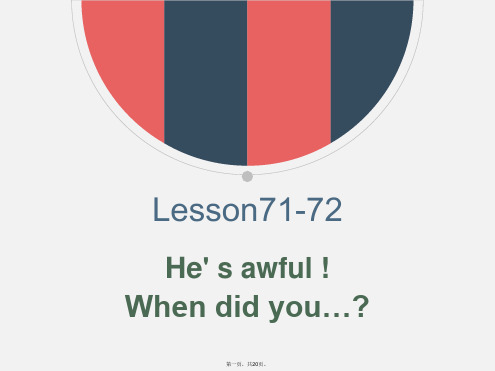
④ tell vt. “告诉(ɡào sù),对某人讲…”
tell sb. sth. =tell sth. to sb.告诉(ɡào sù)某人… tell sb to do sth 让某人做…… tell the truth 说实话 tell a lie 说谎话 tell a story 讲故事 tell the time 报时
This afternoon yesterday afternoon
the day before yesterday in the afternoon
This evening
yesterday evening
the day before yesterday in the evening
tonight
they/clean their shoes/ yesterday What did they do yesterday? She cleaned their shoes yesterday.
第二十页,共20页。
一般过去时(II)句型(jù xínɡ):例句
如: 陈述句:I walked to school yesterday. 否定句:I didn’t walk to school yesterday. 一般(yībān)疑问句:Did you walk to school yesterday? 回答:Yes, I did. /No, I didn’t.
2.以不发音的e结尾的动词(dòngcí)直接加_d telephone---telephoned arrive---arrived
新概念第一册lesson71-72完整版
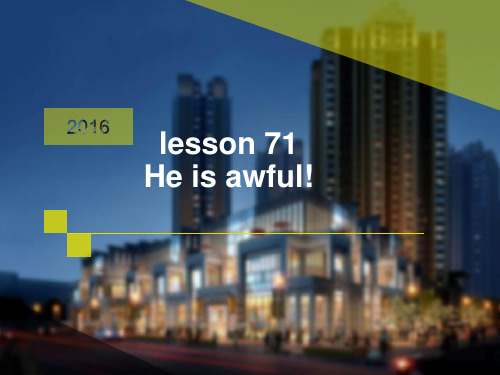
• 3.) 一般疑问句及其回答: • did +主语+动词原形+其它?句末用问号。 • 肯定回答:yes, …did. • 否定回答:No, …didn’t. • 如:did he telephone you four times yesterday? yes, he did . / no, he didn’t. • 4.) 特殊疑问句:特殊疑问词+ did +主语+动 • 词原形+其它?句末用问号。 • 如:Then did he telephone you four times? • He telephoned me four times yesterday?
C
in three hours
D
three hours before
LOREM IPSUM DOLOR
• • • • • • • • • • • • • • • The twins__in Dalian last year. they___here now. a.are,were b.were,are c.was,are d.were,was I cleaned my classroom ___________. A with three hours B three hours ago
• speak to sb. 与某人说话 我能和Jack说话吗? May I speak to Pauline, please? =I’d like to speak to Pauline, please. • 在电话中回答:This is…. • pretend as 假装 She pretended herself as her mother.
LOREM IPSUM DOLOR
新概念英语第一册第71-72课-He’s awful
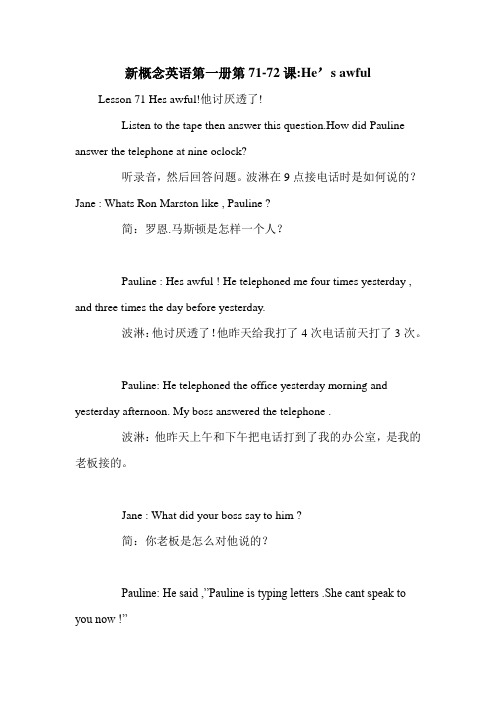
新概念英语第一册第71-72课:He’s awful Lesson 71 Hes awful!他讨厌透了!
Listen to the tape then answer this question.How did Pauline answer the telephone at nine oclock?
听录音,然后回答问题。
波淋在9点接电话时是如何说的?Jane : Whats Ron Marston like , Pauline ?
简:罗恩.马斯顿是怎样一个人?
Pauline : Hes awful ! He telephoned me four times yesterday , and three times the day before yesterday.
波淋:他讨厌透了!他昨天给我打了4次电话前天打了3次。
Pauline: He telephoned the office yesterday morning and yesterday afternoon. My boss answered the telephone .
波淋:他昨天上午和下午把电话打到了我的办公室,是我的老板接的。
Jane : What did your boss say to him ?
简:你老板是怎么对他说的?
Pauline: He said ,”Pauline is typing letters .She cant speak to you now !”。
- 1、下载文档前请自行甄别文档内容的完整性,平台不提供额外的编辑、内容补充、找答案等附加服务。
- 2、"仅部分预览"的文档,不可在线预览部分如存在完整性等问题,可反馈申请退款(可完整预览的文档不适用该条件!)。
- 3、如文档侵犯您的权益,请联系客服反馈,我们会尽快为您处理(人工客服工作时间:9:00-18:30)。
• say 说的内容 • say “sorry” / ’hello’ to sb • speak to sb/某种语言 • All of us speak Chinese. • talk 谈话 • The teacher talked with my mother last night. • tell 告诉 • Tell him the good news. • tell a story
again [ə'ɡen] again and again 一而再再而三 adv. 又一次地
say [seɪ] (said [sed])
v.
说
last: 最后的 He was the last one to leave the classroom. 前一次的 last year/season/month/week/night
Mary took a few minutes to answer the door. 玛丽拖了几分钟时间才去开门。 ② n. 答案;解决办法;答复
the answer/key to the question
Do you know the answer to Question 10? 你知道问题10的答案吗?
一般过去时
语 法
概念:表示过去某一时间发生
回 的动作或存在的状态,通常以
顾
动词的过去式表示,其否定句
和各种疑问句靠助动词did构成。
一般过去时(I)
语 构成1:(过去时间存在的状态)
Time will tell. 时间会证明一切。 Time and tide wait for no man. 岁月不等人。 Time heals all wounds. 时间会治愈所有的创伤。
★answer v. 接(电话)
① v. 对……作出反应;响应 answer the phone/telephone 接电话 answer the door/doorbell 应声开门
★time n. 次(数)
time作不可数名词时表示“时间”; 作可数名词时表示“次数”,三次或三次以上通常用
基数词+times表示: once,twice,three times, four times
常用短语: on time 按时,准时
in time 及时 例:He arrived here on/in time.
be
现在式:
are is
am
过去式:
were was was
There be
一般现在时
单:There is a/ an … 复:There are some …
一般过去时
单:There was a/an … 复:There were some …
Lesson 71
He’s awful
New Words:
awful
[ˈɔ:fəl]ຫໍສະໝຸດ adj. 让人讨厌的,坏的
telephone ['telɪfəʊn]
v. & n. 打电话;电话
time [taɪm]
n.
次(数);时间
answer ['ɑ:nsə(r)]
v.
接(电话);回答
last [lɑ:st]
adj.
最后的,前一次的
phone [fəʊn]
n.
电话(=telephone)
用介词 at on in with after填空
1. We were__the stationer’s__September 9th. 2. We were there___four o’clock.
3. I was__Beijing ____2007. 4. He is sitting ___ the left. 5. What are you going to do ___ that vase? 6. There are 11 people___the race. 7. The boy is running ___ a dog. 8. You can see us __ the crowd. 9. He is going to come back ___ the weekend.
Listen to the tape then answer the following question:
How did Pauline answer the telephone at nine o'clock?
What is sb./sth. like? 某人或某物怎么样?
JANE: What's Ron Marston like, Pauline? PAULINE: He's awful!
PAULINE: Then I arrived home at six o'clock yesterday evening. He telephoned again. But I didn't answer the phone! JANE: Did he telephone again last night? PAULINE: Yes, he did.
He telephoned me four times yesterday, and three times the day before yesterday.
Office
PAULINE: He telephoned the office yesterday morning and yesterday afternoon.
He telephoned at nine o'clock.
JANE: What did you say to him? PAULINE: I said, 'This is Pauline's mother.
Please don't telephone my daughter again!' JANE: Did he telephone again? PAULINE: No, he didn't!
